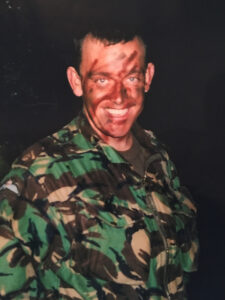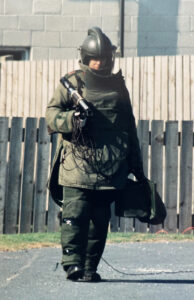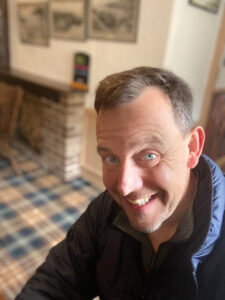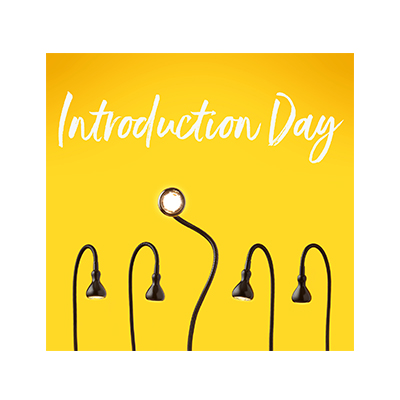 I’m the eldest of three sons from a family with a long history of military service. Our father was in the parachute brigade when I was young and was often away. Although I was born in the UK, army life meant that we moved every 18 months or 2 years. Many children in the services are sent to boarding school, but my parents weren’t keen on that idea and nor was I. The result was that I went to four or five primary schools and four secondary schools while we moved around the UK and Germany. It set up a pattern of not being able to settle and a sense of insecurity that continued into my adult life. I’m now in my fifties and I’ve lived in 32 houses and numerous countries.
I’m the eldest of three sons from a family with a long history of military service. Our father was in the parachute brigade when I was young and was often away. Although I was born in the UK, army life meant that we moved every 18 months or 2 years. Many children in the services are sent to boarding school, but my parents weren’t keen on that idea and nor was I. The result was that I went to four or five primary schools and four secondary schools while we moved around the UK and Germany. It set up a pattern of not being able to settle and a sense of insecurity that continued into my adult life. I’m now in my fifties and I’ve lived in 32 houses and numerous countries.
Both my parents were brought up by mothers who were widowed young at a time when simply having a roof over your head and food on the table was something to be grateful for. This survival mentality passed down to us boys. Although we were loved and cared for, displays of affection were rare; a ‘stiff upper lip’ was always approved of and conversations about feelings just weren’t on the agenda. Hard work, competition and sport were how men were validated.
The endless partings in my childhood meant that I had many acquaintances but few close friends. I was always the ‘new boy’, joining classes where bonds had already formed over many years. I learned to adapt and to gain attention and approval from my peers by being the class clown, or having to have the odd fight to determine my place in the pecking order.
 I left school in 1988, aged 18, and after a short spell in a civilian job, I decided to find adventure. I joined the army and (after training) took part in the Gulf War in 1991. On my return, I was selected to attend Sandhurst to train as an officer. Over the following twenty years I moved up the ranks, always up for a challenge or an operational tour. For a man with a fear of standing still, the Army was perfect. I was lucky enough to lead people in Northern Ireland, Bosnia, Kosovo, Iraq and Afghanistan. I loved the responsibility and (in hindsight) was spending a lot of energy solving other people’s problems instead of addressing my own. I was leading – leaping in first and fixing. Activity to mask feelings. For much of the time I was working in bomb disposal – seeking fulfilment through demanding, challenging and occasionally dangerous roles.
I left school in 1988, aged 18, and after a short spell in a civilian job, I decided to find adventure. I joined the army and (after training) took part in the Gulf War in 1991. On my return, I was selected to attend Sandhurst to train as an officer. Over the following twenty years I moved up the ranks, always up for a challenge or an operational tour. For a man with a fear of standing still, the Army was perfect. I was lucky enough to lead people in Northern Ireland, Bosnia, Kosovo, Iraq and Afghanistan. I loved the responsibility and (in hindsight) was spending a lot of energy solving other people’s problems instead of addressing my own. I was leading – leaping in first and fixing. Activity to mask feelings. For much of the time I was working in bomb disposal – seeking fulfilment through demanding, challenging and occasionally dangerous roles.
My childhood training in ‘just getting on with it’ meant I was able to keep detached and focussed when doing bomb disposal work. It also meant that I was able to cope with the ‘normal’ trauma of army life – from telling people they had been widowed through to just accepting some of the nastier sights I saw on deployments and in training. Like service people down the ages I dealt with it in the time-honoured army way – getting on with the task in hand and then (when able to) drinking into the small hours and masking emotions with ‘banter’.
In 2014 I left the army, but I continued my pattern of moving. I secured a great job that had me back in Afghanistan now and again and working in UAE, Kenya, Uganda, Oman as well as other places. During this time I met and married an ex-army officer who both understood and reflected many of the behavioural patterns that stem from a background in the services. Fast forward seven years to 2021 and I could feel that I was ‘getting by’ in life, but not really engaged with it. I was living in a defensive pattern and I knew something needed to change if I wasn’t going to end up in a downward spiral.
At this point, a friend mentioned Hoffman. His girlfriend had just come back from the Process so transformed that he’d been inspired to sign up for it himself. I jumped on the website, did my research and finally enrolled for what turned out to be a life-changing week.
 On the Process I discovered that in spite of all my worries, insecurities, defences and deflection, I’m actually quite lovable – and that I had a chance of real lasting happiness. I gained a really different perspective on my parents and was able to finally investigate my childhood pain without needing to mask it with humour, drink or risk-taking. The change is authentic and profound. I was able to hug my parents and tell them I loved them, a marked change from the ‘Oh well, just get on with it’ attitude that had featured in any conversation that bordered on feelings in the previous few years. They were taken aback, but the reaction had us all bawling and smiling. My relationship with them is warmer now than it has ever been.
On the Process I discovered that in spite of all my worries, insecurities, defences and deflection, I’m actually quite lovable – and that I had a chance of real lasting happiness. I gained a really different perspective on my parents and was able to finally investigate my childhood pain without needing to mask it with humour, drink or risk-taking. The change is authentic and profound. I was able to hug my parents and tell them I loved them, a marked change from the ‘Oh well, just get on with it’ attitude that had featured in any conversation that bordered on feelings in the previous few years. They were taken aback, but the reaction had us all bawling and smiling. My relationship with them is warmer now than it has ever been.
The Process was really transformational for me, but I have to remember that although I feel profoundly changed, other people are still the same. The difference in me has been remarked upon, although nobody can quite put their finger on it. I feel calmer and more settled, I love where I live and I love my life. I feel happier and spend more time in the present rather than dwelling on the past or worrying about the future. I’m more connected to my life and (I’m told) the twinkle is back in my eye. I go out more, see more people and reach out to friends in a way I never would have done before.
For example, a friend’s wife had some bad news recently, and it was clear from my friend’s text messages he was deeply upset but stoic. Instead of resorting to ‘stiff upper lip’ programming, I called him and told him I loved him and I cleared my day to take him to lunch to talk. We had a really meaningful conversation and I listened without my old pattern of needing to fix. I realise now that fixing was my way of showing that I cared. I loved to feel I was saving a situation, but now I realise that people need to make their own choices when (and if!) they’re ready to make them.
I also reached out to an old peer in the bomb disposal world who from his Facebook posts was showing a much deeper and more thoughtful side than he had before. Once upon a time we were very competitive with each other, but both of us have opened our minds and we had a really open-hearted exchange. The Process gave me the tools to say what I feel, rather than suppress my caring side.
For anyone who has served in the military or any of the other jobs where being ‘tough’ is considered important – don’t for one second think Hoffman is easy. It’s a challenging, difficult, honest, amazing week, where you will have to confront things you might have been hiding forever. But the lightness you feel afterwards is an incredible reward. My sense of not being lovable still surfaces from time to time, but I have tools from the course that I can use, such as the meditations that I often do on my train commute to London. The regular support groups are a great reinforcement too.
One major takeaway for me was simply the amazing people I met on the Process, facilitators and participants alike. I marvelled at how many lovely people were in the room; now I know that there are always lovely people in any room, I just need to see them through different eyes.
The other stand-out moment was a visualisation we did towards the end of the course when we create a vision for our future. We began by picturing ourselves standing in our current house and as I saw myself there I clearly heard the words ‘You are home’. That’s all I ever needed.
We thank David for sharing his Process Story with the wider Hoffman community. If what you have read resonated with you, David would like to commend the work of the Army Benevolent Fund: https://soldierscharity.org






 Sign up to receive monthly newsletters from Hoffman
Sign up to receive monthly newsletters from Hoffman